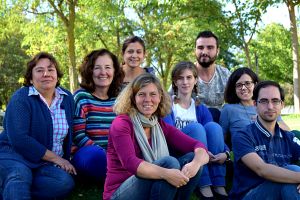A collaborative initiative against cancer between the Centro Nacional de Biotecnología of the CSIC (CNB-CSIC) and the Innopharma Platform of the University of Santiago (USC) has been selected as one of the winning projects of the 2015 Discovery Fast Track programme of the company GlaxoSmithKline (GSK).
Doctors Isabel Mérida (CNB-CSIC), Angel Carracedo and Mabel Loza (USC) will work together with a team of GSK scientists to identify compounds in their their chemical library that are useful in the fight against cancer.
Active drugs will be sought against a specific target. The active compounds detected could form the basis of a full drug discovery program, leading ultimately to the development of new anti-cancer drugs.
The GSK Discovery Fast Track programme aims to convert basic research conducted at academic centres into new therapies. Together with the CNB/USC initiative, five other projects were awarded, from among 378 proposals from around the world.
About the scientists:
Dr. Isabel Merida leads the lipids signaling group in the Department of Immunology and Oncology at the Centro Nacional de Biotecnología (CNB-CSIC) in Madrid. Her team specialises in the study of the mechanisms that control the immune response and tumour progression. She is a CSIC Research Professor and, since 2008, vice-director of the CNB.
Dr. Ángel Carracedo is the coordinator of Genomic Medicine at the USC. He is Full Professor of the Faculty of Medicine (USC), Director of the Galician Foundation of Genomic Medicine (SERGAS, Galician Health Service), Director of the Spanish National Centre for Genotyping (PRB2-ISCIII) and group leader at the Biomedical Research Networking Centre on Rare Diseases (CIBERER). He was also director of the Institute of Forensic Medicine (USC) from 1992-2013.
Dr. Mabel Loza coordinates the USC BioFarma research group. Since 1998, she has worked in academic research oriented to early drug discovery in collaboration with the pharmaceutical and biotechnology industry. She holds a PhD in Pharmacy (USC) and is Full Professor of Pharmacology at the USC. She had several research internships between 1992 and 1994 in the Departments of Physiology and Biophysics and the Department of Anesthesiology at the Mount Sinai Medical Center in New York.
About the Discovery Partnerships with Academia programme
The Discovery Partnerships with Academia (DPAc) programme was launched by the pharmaceutical company GSK in late 2010. It was created to unite the extensive experience of academic centres in the fields of biology and of certain diseases with GSK’s competence and knowledge in drug discovery. The purpose is to create integrated teams that collaborate in the discovery of new medicines for patients. In this type of programme, GSK and the collaborating academic centre share the challenges and successes of innovation. GSK funds research activities in the collaborating laboratories and contributes its expertise and resources for development of the programme. From the idea to the drug.






